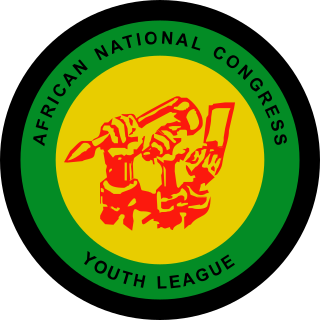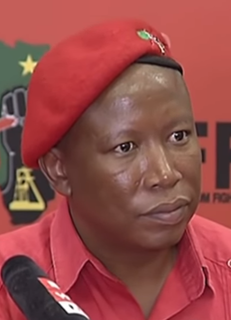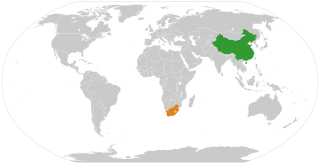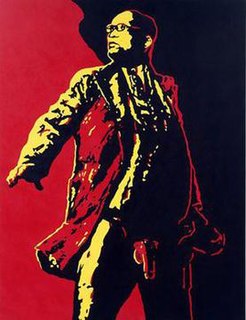Related Research Articles

The African National Congress (ANC) is the Republic of South Africa's governing political party. It has been the ruling party of post-apartheid South Africa since the election of Nelson Mandela in the 1994 election, winning every election since then. Cyril Ramaphosa, the incumbent President of South Africa, has served as leader of the ANC since 18 December 2017.

Thabo Mvuyelwa Mbeki is a South African politician who served as the second president of South Africa from 16 June 1999 to 24 September 2008. On 20 September 2008, with about nine months left in his second term, Mbeki announced his resignation after being recalled by the National Executive Committee of the ANC, following a conclusion by judge C. R. Nicholson of improper interference in the National Prosecuting Authority (NPA), including the prosecution of Jacob Zuma for corruption. On 12 January 2009, the Supreme Court of Appeal unanimously overturned judge Nicholson's judgement but the resignation stood.

The Inkatha Freedom Party (IFP) is a political party in South Africa. The party has been led by Velenkosini Hlabisa since the party's 2019 National General Conference. Mangosuthu Buthelezi founded the party in 1975 and led it until 2019. The IFP is currently the fourth largest party in the National Assembly of South Africa, in 2014 yielding third place to the Economic Freedom Fighters, formed in 2013.

Jacob Gedleyihlekisa Mhlanganyelwa Zuma is a South African politician who served as the fourth President of South Africa from the 2009 general election until his resignation on 14 February 2018. Zuma is also referred to by his initials JZ and his clan name Msholozi.

Nkosazana Clarice Dlamini-Zuma, sometimes referred to by her initials NDZ, is a South African politician and anti-apartheid activist, currently serving as Minister of Cooperative Governance and Traditional Affairs. She was South Africa's Minister of Health from 1994 to 1999, under President Nelson Mandela, Minister of Foreign Affairs, under both President Thabo Mbeki and President Kgalema Motlanthe, Minister of Home Affairs in the first term of former President Jacob Zuma and Minister in the Presidency for the National Planning Commission for Policy and Evaluation under President Cyril Ramaphosa.

The African National Congress Youth League (ANCYL) is the youth wing of the African National Congress (ANC). As set out in its constitution the ANC Youth League was supposed to be led by a National Executive Committee (NEC) and a National Working Committee (NWC). But due to political dynamics, after the disbandment of the ANCYL National Executive Committee that was led by Collen Maine and the subsequent rejection of the National Youth Task Team by young people, on the basis of illegitimacy, it is led by the ANCYL Crisis Committee

Kgalema Petrus Motlanthe is a South African politician who served as President of South Africa between 25 September 2008 and 9 May 2009, following the resignation of Thabo Mbeki.

South Africa since 1994 transitioned from the system of apartheid to one of majority rule. The election of 1994 resulted in a change in government with the African National Congress (ANC) coming to power. The ANC retained power after subsequent elections in 1999, 2004, 2009 and 2014. Children born during this period are known as the born-free generation, and those aged eighteen or older, were able to vote for the first time in 2014.

The Strategic Defence Package or the Strategic Defence Acquisition, popularly referred to as the Arms Deal was a South African military procurement programme. It involved a US$4.8 billion purchase of weaponry by the African National Congress government led by Nelson Mandela in 1999. It has been subject to repeated, seemingly substantive, allegations of corruption.

Julius Sello Malema is a South African politician and activist who is a Member of Parliament and the President and Commander-in-Chief of the Economic Freedom Fighters, a South African political party, which he founded in July 2013. He previously served as President of the African National Congress Youth League from 2008 to 2012. Malema was a member of the ANC from the age of nine until his expulsion from the party in April 2012 at the age of thirty-one. He occupies a notably controversial position in South African public and political life, having risen to prominence with his support for ANC president, and later President of South Africa, Jacob Zuma. He was described by both Zuma and the Premier of Limpopo Province, Cassel Mathale, as the "future leader" of South Africa. Less favourable portraits paint him as a "reckless populist" with the potential to destabilise South Africa and to spark racial conflict.
Fikile April Mbalula is a South African politician who is currently serving as Minister of Transport. He previously served as both Minister and Deputy Minister of Police and Minister of Sports and Recreation. Mbalula is a member of the National Executive Committee of the African National Congress and former leader of the African National Congress Youth League.

The Congress of the People (COPE) is a South African political party formed in 2008 by former members of the African National Congress (ANC). The party was founded by former ANC members Mosiuoa Lekota, Mbhazima Shilowa and Mluleki George to contest the 2009 general election. The party was announced following a national convention held in Sandton on 1 November 2008, and was founded at a congress held in Bloemfontein on 16 December 2008. The name echoes the 1955 Congress of the People at which the Freedom Charter was adopted by the ANC and other parties, a name strongly contested by the ANC in a legal move dismissed by the Pretoria High Court.
Vusumzi "Vusi" Pikoli is a South African advocate and the former head of South Africa's National Prosecuting Authority. He is noted for instigating criminal charges against disgraced South African police commissioner Jackie Selebi and ANC president Jacob Zuma. In 2008 he was suspended from his duties by President Thabo Mbeki, a close confidant of Selebi, and then subsequently fired by Mbeki's successor, Kgalema Motlanthe, who is an ally of Zuma. As such, opposition parties and sections of the press have claimed Pikoli is the victim of two separate political conspiracies. In October 2014 Pikoli was appointed as the Western Cape's first police ombudsman by Premier Helen Zille, whose choice was unanimously backed by the provincial legislature's standing committee on community safety.
Internet censorship in South Africa is a developing topic.
The South African Protection of State Information Bill, formerly named the Protection of Information Bill and commonly referred to as the Secrecy Bill, is a highly controversial piece of proposed legislation which aims to regulate the classification, protection and dissemination of state information, weighing state interests up against transparency and freedom of expression. It will replace the Protection of State Information Act, 1982, which currently regulates these issues.

People's Republic of China – South Africa relations refer to the current and historical relationship between the People's Republic of China (PRC) and the Republic of South Africa.

The New Age newspaper was a South African national daily newspaper, owned and operated by TNA Media (Pty) Ltd. TNA Media was established in June 2010 and the first publication of The New Age was on 6 December 2010. It was re-branded as Afro Voice in April 2018. Its last edition was published on 29 June 2018.

The Spear is a painting by Cape Town-based South African artist, Brett Murray. It depicts former South African President Jacob Zuma in a pose reminiscent of Lenin, with his genitals exposed. The painting triggered a defamation lawsuit by Zuma's party, the African National Congress (ANC), and was vandalised on 22 May 2012.
Thulisile Nomkhosi "Thuli" Madonsela is a South African advocate and professor of law, holding a chair in social justice at Stellenbosch University since January 2018. She served as the Public Protector of South Africa from 19 October 2009 to 14 October 2016. In 1996, she helped draft the final constitution of South Africa promulgated by then-President Nelson Mandela.
The Institute for Democratic Alternatives in South Africa (IDASA) later known as the Institute for Democracy in South Africa was a South African-based think-tank organisation that was formed in 1986 by Frederik van Zyl Slabbert and Alex Boraine. Its initial focus from 1987 was creating an environment for white South Africans to talk to the banned liberation movement in-exile, the African National Congress (ANC) prior to its unbanning in 1990 by the President F. W. de Klerk. After the South African election in 1994, its focus would be on ensuing the establishment of democratic institutions in the country, political transparency and good governance. Caught up in a funding crisis after the 2008 global financial crisis, it would close in 2013.
References
- 1 2 3 "Media Diversity and Ownership" (PDF). NGC 2010 Discussion Document. 2010-06-29. Retrieved 2010-08-28.
- ↑ Zuma, Jacob (13–19 August 2010). "Let the real media debate begin". ANC Today. Retrieved 2010-08-27.
- ↑ 52nd National Conference of the African National Congress: Resolution 9 (125-131).
- ↑ Berger, Guy (2010-08-04). "Taking the ANC media tribunal at face value". Thought Leader. Mail & Guardian. Retrieved 2010-08-28.
- ↑ Berger, Guy (2010-07-29). "Four lessons on the media tribunal". Converse. Mail & Guardian. Retrieved 2010-08-28.
- ↑ Mandy, Rossouw (14 January 2011). "ANC backtracks on media tribunal". Mail & Guardian. Retrieved 23 April 2011.
The African National Congress (ANC) has temporarily backed down from its fervent call to establish a media appeals tribunal, but is adamant the press council must reform its rules to include the imposition of fines, in addition to the publication of apologies, for newspapers' mistakes.